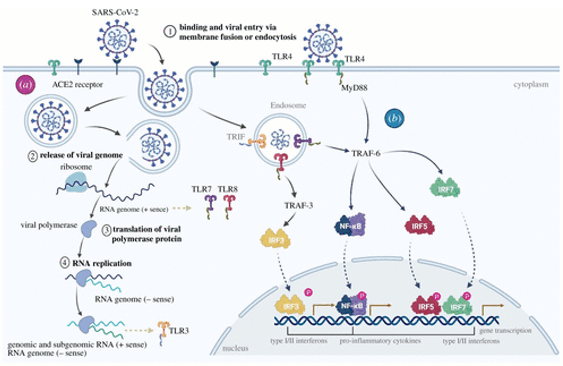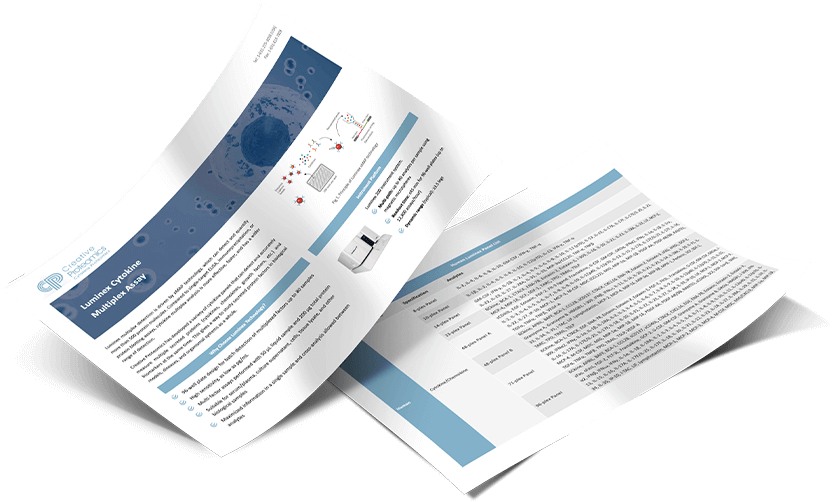Introduction
A variety of etiologies and pathological conditions can cause cytokine storms. Not all syndromes involving cytokine release will have the same spectrum of pathogenic cytokine analysis. Therefore, it is necessary to simultaneously detect the changes of multiple cytokines on a limited sample. Creative Proteomics can provide you with multi-factor detection services to quantify multiple soluble immune biomarkers simultaneously from a single sample.
Cytokine storm and cytokine release syndrome (CRS)
Cytokine storm is related to a variety of infectious and non-infectious diseases, and is a systemic inflammatory response induced by infection, drugs and other factors. Cytokine storms may also occur in some treatment environments, such as cancer immunotherapy and CAR-T cell therapy.
The cause of the cytokine storm is the imbalance of the body's immune response. After pathogens infect the host, activated T cells or lysed immune effector cells will release a large number of pro-inflammatory cytokines and chemokines. However, as the course of the disease progressed, an uncontrolled overreaction occurred. These proliferation of pro-inflammatory cytokines and chemokines (including IL-1, IL-6, IL-17, IL-12, TNF-α, IFN-α, IFN-β, IFN-γ, MCP-1, etc.) leads to the activation of macrophages, DCs, other immune cells, and endothelial cells. Thus, the imbalance of immune regulatory network, the absence of negative feedback and the continuous self-amplification of positive feedback result in the formation of cytokine cascade reaction, which leads to the start of cytokine storm and damage the homeostasis of the autoimmune system and normal tissue cell function.
The common symptom of cytokine storm syndrome is immune imbalance, which causes excessive inflammation, fever, blood cell reduction, splenomegaly, hepatitis, coagulopathy, and may lead to fatal multi-system organ dysfunction.

Detectable cytokines include but are not limited to:
| G-CSF (CSF-3) | GM-CSF | IFN-α | IFN-γ | IL-1β |
| IL-2 | IL-4 | IL-5 | IL-6 | IL-8 |
| IL-10 | IL-12 | IL-13 | IL-17A (CTLA-8) | IL-18 |
| IP-10 (CXCL10) | MCP-1 (CCL2) | MIP-1α (CCL3) | MIP-1β (CCL4) | TNF-α |
| TNF-β |
Technology platform
We mainly provide the Luminex cytokine detection platform. Luminex uses fluorescently encoded microspheres with specific antibodies to different target molecules. The different microspheres can be combined freely to a certain extent so that up to 100 analytes can be tested multiple times simultaneously in a single experiment.
The Luminex cytokine assay platform has the following advantages:
- Multiple detection: simultaneous detection of 100 biological targets
- Short experiment time: 1-3 weeks
- High sensitivity: the lower limit of accurate quantification is as low as 0.1 pg/mL
- Save samples: only need a sample volume as low as 25 μL
- Time saving: the experiment process only takes 4 hours
For your different needs, we can also provide the following detection methods:
- Flow cytometry (FACS analysis): Identify and measure cell biomarkers in complex subpopulations. It can be used for intracellular cytokine detection without two hours.
- Enzyme-linked immunosorbent assay (ELISA): Use the primary antibody for capture, and conjugate the secondary antibody with an enzyme or radioisotope for detection. Our multiplexing system can detect the expression of multiple cytokines at once.
Sample preparation
- Suitable for serum, plasma, cell culture supernatant and all kinds of body fluids.
- Cells (whole blood cells, PBMC, mouse immune cells)
- The body fluid samples are stored in a refrigerator at -80 degrees Celsius and transported on dry ice.
Creative Proteomics can provide you with a one-stop solution. If you want to test other cytokines or other information you want to consult, please contact us. We are looking forward to cooperating with you.
Reference:
- Fara A, Mitrev Z, Rosalia R A, et al. Cytokine storm and COVID-19: a chronicle of pro-inflammatory cytokine. Open biology, 2020, 10(9): 200160.

